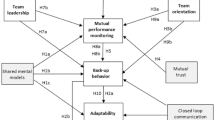Abstract
Study of large-scale coordination seeks us to understand work between and across groups beyond earlier conceptions of social human factors. Revealing the complexity of work domains and the subtle yet effective ways that workers negotiate its challenges opens the way to develop support tools that are grounded in a scientific understanding. This first special issue in Large-Scale Coordination shows the breadth of application research from air traffic control to the military and multi-agency emergency response. A second special issue later this year will show depth of research at large scale in healthcare.
Similar content being viewed by others
References
Bardram JE (2000) Temporal coordination: on time and coordination of collaborative activities at a surgical department. Computer-supported cooperative work 9. Kluwer Academic Publishers, Amsterdam, pp 157–87
Christoffersen K, Woods D (2002) How to make automated systems team players. Adv Hum Perform Cogn Eng Res 2:1–12
De Keyser V (1988) The meaning of work and technological operations. John Wiley and Sons, New York
Hollnagel E (2006) Resilience-The challenge of the unstable. In: Hollnagel E, Woods D, Leveson N (eds) Resilience engineering: concepts and precepts. Ashgate, Aldershot, UK
Hollnagel E, Woods DD (2005) Joint cognitive systems: foundations of cognitive systems engineering. CRC Press/Taylor and Francis, New York
Klein G (2000) Sources of power. The MIT Press, Cambridge, MA
Klein G, Woods D, Bradshaw J, Hoffman R, Feltovich PJ (2004) Ten challenges for making automation a “team player” in joint human-agent activity. IEEE Intell Syst 19(6):91–95
Luff P, Hindmarsh J, Heath C (2000) Workplace studies: recovering work practice and informing system design. Cambridge University Press, New York
Nardi BA, Whittaker S, Schwarz H (2002) Networkers and their activity in intensional networks. In: Nardi B, Redmiles D (eds) Special issue: activity theory and the practice of design. Computer Supported Cooperative Work 11. pp 205–242
Nemeth C (2005) Large scale coordination: studying groups at work. In: Proceedings of the Human Factors and Ergonomics Society National Conference, Orlando
Nemeth C, Cook R, Woods D (2004) The messy details: insights from technical work in healthcare. In: Nemeth C, Cook R, Woods D (eds) Special issue on studies in healthcare technical work. IEEE Trans Syst Man Cybern A 34(6):689–692
Norman DA (1986) Cognitive engineering. In: Norman DA, Draper S (eds) ``User centered system design: new perspectives on human-computer interaction’’. Lawrence Erlbaum Associates, Mahwah, NJ, pp 31–61
Obradovich J, Smith P (2003) Design concepts for distributed work systems: an empirical investigation into distributed teams in complex domains. In: Proceedings of the Human Factors and Ergonomics Society 47th Annual Meeting. pp 354–358
Woods D (2000) Studying cognitive systems in context: the cognitive systems triad. Institute for Ergonomics, The Ohio State University, Columbus, OH Retrieved from CSEL web site: <http://www.csel.eng.ohio-state.edu/productions/woodscta/>. Cited 30 April 2005
Woods D (2005) Generic support requirements for cognitive work: laws that govern cognitive work in action. Institute for Ergonomics, The Ohio State University, Columbus, OH Retrieved from CSEL web site: <http://csel.eng.ohio-state.edu/productions/woodscta/>. Cited 30 April 2005
Woods D, Roth E (1988) Cognitive systems engineering. In: Helander M (ed) Handbook of human–computer interaction. North-Holland, Amsterdam, pp 3–43
Acknowledgements
Dr. Nemeth is grateful to each of the contributing authors, particularly those who participated in the original 2005 Human Factors and Ergonomics Society symposium on Large Scale Coordination that formed the genesis for this special issue. His research is sponsored by a grant (R03 LM007947) from the National Library of Medicine, NIH, Valerie Florance, Ph.D., Deputy Director.
Author information
Authors and Affiliations
Corresponding author
Rights and permissions
About this article
Cite this article
Nemeth, C.P. Groups at work: lessons from research into large-scale coordination. Cogn Tech Work 9, 1–4 (2007). https://doi.org/10.1007/s10111-006-0049-5
Published:
Issue Date:
DOI: https://doi.org/10.1007/s10111-006-0049-5




